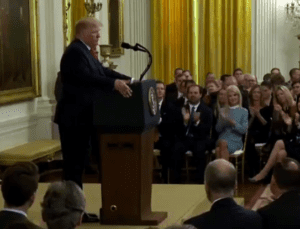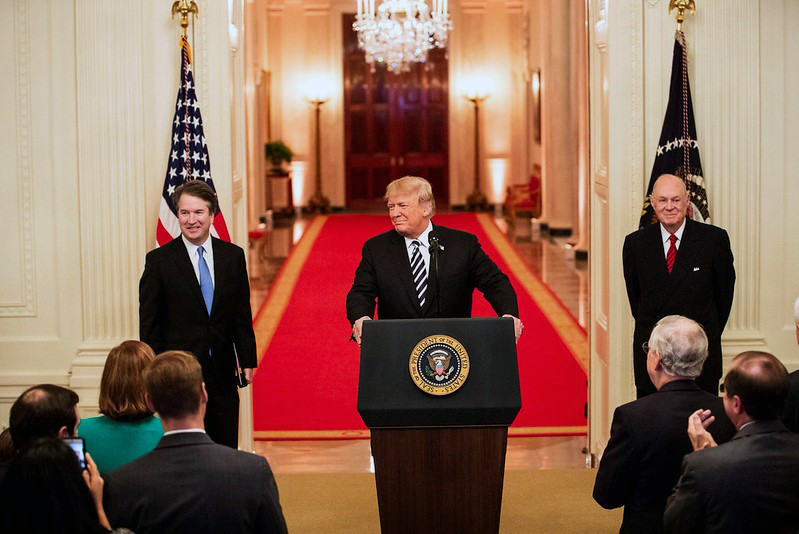Right at the top of the list of President Donald J. Trump’s legacy is his amazing work on judicial nominations. In just under three years, the U.S. Senate has confirmed the most circuit court judges in a president’s first term since 1980. With several confirmations this week, one out of every four circuit court judges are now a Trump nominee.
The Senate has confirmed a total of 159 judges with more ready to be confirmed at any moment. Forty-five of those are circuit court judges, 112 to the district court, and, of course, two Supreme Court justices.
 This week, the President took some time to celebrate the great work their team has been doing on this front. Concerned Women for America’s (CWA) Vice-President of Government Relations Doreen Denny was at the White House to mark the occasion.
This week, the President took some time to celebrate the great work their team has been doing on this front. Concerned Women for America’s (CWA) Vice-President of Government Relations Doreen Denny was at the White House to mark the occasion.
CWA supporters have been crucial in the Trump Administration’s success through our support of the many judicial nominees. The two Supreme Court nominees, Neil Gorsuch and Brett Kavanaugh, were most prominent, of course.
Which brings us to the most important point about the Trump legacy. It is not about the numbers. It is not about being a Republican or a Democrat. The fact is CWA’s support and the President’s success is worth celebrating because of the type of judges the president has nominated. His commitment to nominating constitutionalists who refrain from interjecting personal policy preferences into the judicial decision has been unwavering. That is why his number will have such a great impact for all Americans, regardless of political persuasion.
When judges are committed to the text of the Constitution and the laws as written, everyone wins. Remember, the danger of the “living, breathing constitution” is not that the Constitution is amended (the Founders indeed provided a way for the Constitution to be amended, since they knew this must happen—that’s what the Bill of Rights is), it is how it is done. For unelected judges to simply amend the Constitution at their pleasure breaks the most fundamental tenets of our Republic. It is “we the people” who are the “supremes” under our Constitution, not unelected judges.
Therefore, with judges who abide by the text of the Constitution and the laws as written, everyone should feel empowered. They are free to persuade their fellow citizens of their preferred policy positions and work through the legislatures to see that those changes are made. To continue to allow judges to implement one side’s preferred policy changes by judicial fiat is to live under judicial tyranny.
President Trump noted this in his remarks this week saying,
“This system was designed to protect citizens against the unjust concentration of governmental power … [but] when judges assume the role of a legislature, the rights of all citizens are threatened. … When judges write policy instead of applying the law, they impose sweeping changes on millions of Americans without the benefit of legislative debate, public rulemaking, or the consent of the governed. As a result, these highly political rulings inflict painful damage on our security, society, and economy—imposing unworkable edicts on businesses, workers, families, and law enforcement.”
That’s music to my ears.
President Trump also noted that the average age of his circuit judges is less than 50 years old—10 years younger than the average age was for President Obama. This means that this legacy will have a lasting effect on the judiciary. We simply cannot overstate how important this is for the protection of our freedoms.
This success should also highlight for us how important the next election will be. Part of the reason for the president’s success was the rule change made by former Senate Majority Leader Harry Reid who opened the door to get rid of the filibuster of judicial nominees. That reality will benefit whoever is in office. If someone committed to judicial activists is elected President, he too would be able to confirm judges at a faster pace, especially if the same party controls the Senate, as President Trump has enjoyed.
This issue must remain at the top of our minds as we consider our choices for the next election.
—
Mario Diaz, Esq. is CWA’s general counsel. Follow him on Twitter @mariodiazesq.






